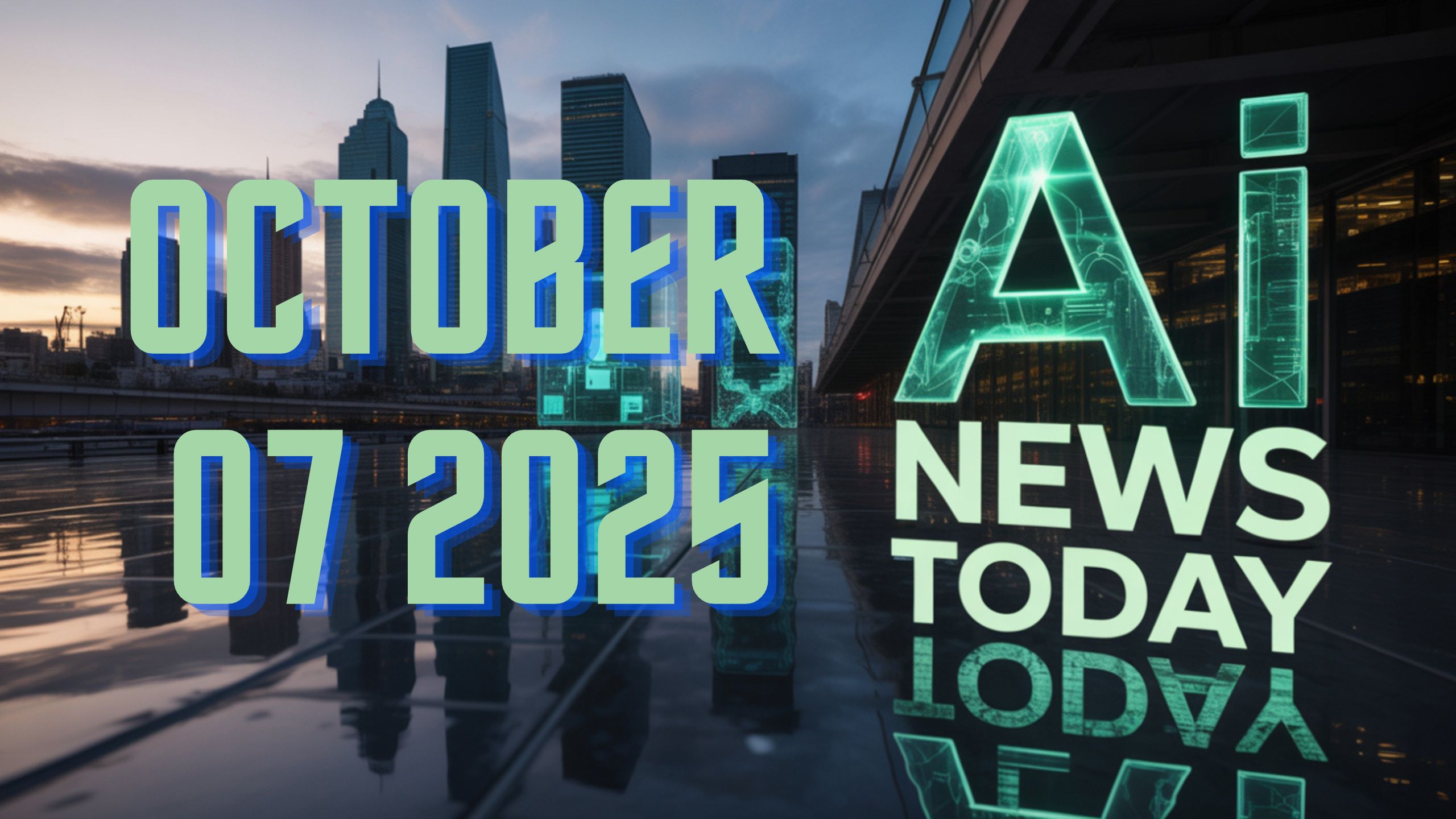AI News Daily — USA (Tuesday, October 7, 2025) — OpenAI has announced a central enterprise-focused pivot, positioning ChatGPT as more than just a conversational AI, but as a central operating system for services. At its San Francisco developer conference, the company announced strategic integrations with leading brands, including Spotify, Zillow, and Mattel, enabling third-party applications to execute tasks directly within ChatGPT. This functionality allows businesses to streamline operations, automate routine workflows, and enhance customer engagement across multiple sectors. OpenAI emphasized that partner data will not be used for AI training without explicit user consent, thereby reinforcing its commitment to privacy and security standards. By embedding AI capabilities into enterprise applications, OpenAI is accelerating adoption across industries, demonstrating a commitment to scalable, secure, and intelligent automation that transforms how organizations interact with technology, data, and users.
OpenAI Accelerates Enterprise Adoption with Strategic Integrations
OpenAI has unveiled a significant enterprise-focused pivot, highlighting its ambitions to evolve ChatGPT into a central operating system for services. At its San Francisco developer conference, OpenAI announced new partnerships with major brands including Spotify, Zillow, and Mattel. These integrations enable third-party applications to execute tasks directly within ChatGPT, creating seamless workflows across various industries, including entertainment, real estate, and consumer products.
Executives emphasized that this expansion is not only about broadening functionality but also about maintaining data privacy and user trust. Partner data, such as music listening habits from Spotify or real estate preferences from Zillow, will not be used for AI training without the user’s explicit consent. This approach underlines OpenAI’s commitment to secure enterprise adoption while positioning ChatGPT as a core operational platform for businesses.
The move is expected to accelerate enterprise AI adoption, with companies leveraging ChatGPT to automate routine tasks, enhance customer interactions, and streamline internal workflows. Analysts note that this strategy could redefine software interoperability, thereby reducing the friction associated with AI deployment across enterprise ecosystems.
Deepening OpenAI–AMD Collaboration Strengthens AI Infrastructure
OpenAI’s collaboration with AMD has captured significant attention, particularly regarding the scale and strategic nature of the multiyear compute agreement. Reports indicate that the deal may include an equity component of up to 10%, highlighting a growing alignment between AI model developers and hardware suppliers amid intense competition for GPU capacity.
Described as a “six-gigawatt class” agreement, this partnership spans multiple GPU generations, signaling the escalating scale of infrastructure required for frontier AI models. The deal reinforces a broader trend of AI companies securing long-term hardware commitments to ensure uninterrupted model training and deployment. AMD’s stock performance surged following these announcements, reflecting market confidence in chipmakers’ central role in AI advancement.
For enterprises, this development translates into enhanced compute availability, lower latency in AI operations, and a robust foundation for deploying large-scale AI applications in both public and private cloud environments.
Google Launches Enhanced AI Security Incentives
In a parallel development, Google has expanded its Vulnerability Reward Program (VRP) to include AI-focused incentives, offering rewards up to $30,000 for identifying critical AI security flaws. These bounties explicitly target rogue actions, including prompt-driven device manipulation or unintended data operations across Search, Gemini, Gmail, and Workspace.
Notably, Google excluded hallucination-type errors from these rewards, focusing instead on risks with tangible security impacts. This initiative is part of Google’s broader commitment to secure AI integration, emphasizing a proactive, security-first approach as AI becomes increasingly embedded in core consumer and enterprise products.
By incentivizing vulnerability discovery, Google aims to harden its AI ecosystem against potential attacks, reinforcing trust in AI solutions for both corporate clients and end-users. Analysts suggest that these security measures are crucial as AI adoption grows across sensitive sectors, including finance, healthcare, and critical infrastructure.
Public Sentiment Highlights Growing National Security Concerns
A recent poll conducted by Semafor indicates that nearly 90% of U.S. adults expect foreign governments to exploit AI for attacks within the next two decades. This reflects heightened public concern over AI-driven security threats, even as optimism persists regarding AI’s potential to advance scientific research and innovation.
The survey also contextualizes OpenAI’s AMD deal within a broader narrative of AI momentum, emphasizing the dual pressures of technological progress and regulatory oversight. These findings suggest that enterprise AI deployments are now operating within a complex environment of public scrutiny, national security concerns, and evolving compliance requirements.
Policymakers and industry leaders are increasingly focused on AI resilience and risk mitigation, indicating that future AI deployment strategies must strike a balance between innovation and safety, as well as transparency and governance.
Labor Market Analysis Shows Limited Disruption So Far
A new study affiliated with Yale University examined the impact of AI on the U.S. labor market. The research concluded that AI has not yet produced widespread disruptions, with overall employment trends appearing stable since 2021. While certain early-career professionals may experience exposure to AI-related shifts, the study finds that economy-wide effects remain largely speculative.
This nuanced perspective informs enterprise workforce planning, highlighting the importance of proactive reskilling and strategic integration rather than reactive restructuring. Companies implementing AI can leverage these insights to design training programs, optimize productivity, and align human resources with emerging AI-driven workflows.
Industry Adoption: AI Penetrates Non-Tech Sectors
Fortune’s AIQ report highlights how non-tech industries are integrating AI into their core operational processes. Payment companies like Visa now treat AI as an integral part of organizational infrastructure, showcasing a transition from experimental pilots to embedded capabilities.
Such adoption underscores AI’s maturation beyond Big Tech, demonstrating its value in enhancing decision-making, fraud detection, transaction processing, and customer engagement. Analysts note that U.S. companies are increasingly leveraged to AI investment and equity performance, suggesting that the economic stakes of AI deployment are higher than ever.
If projected productivity gains fail to materialize, enterprises may face significant operational and financial consequences, underscoring the need for robust AI governance, monitoring, and performance measurement.
Emerging Trends: AI as an Enterprise Operating System
Across sectors, the common theme is the evolution of AI from a supportive tool into a strategic operating system. Companies are integrating AI into:
- Workflow automation: Reducing repetitive tasks and streamlining approvals.
- Data-driven insights: Extracting actionable intelligence from vast datasets.
- Customer engagement: Delivering hyper-personalized interactions at scale.
- Security and compliance: Proactively identifying vulnerabilities and regulatory risks.
This transformation positions AI not just as a productivity enhancer but as a centralized orchestrator of enterprise operations, aligning technological advancement with business strategy.
Conclusion: Strategic Imperatives for Enterprise AI Adoption
The current AI landscape highlights strategic partnerships, infrastructure scaling, and security-focused innovation as critical drivers of enterprise adoption. Companies must navigate public scrutiny, national security considerations, and workforce implications while seizing opportunities to embed AI at the heart of operations.
Organizations that strategically integrate AI, secure robust computing resources, and proactively manage risk will be positioned to capitalize on efficiency gains, enhance competitiveness, and lead in the next wave of technological innovation.
AITeam is the dedicated editorial team of Android Infotech, consisting of experts and enthusiasts specialized in Android-related topics, including app development, software updates, and the latest tech trends. With a passion for technology and years of experience, our team aims to provide accurate, insightful, and up-to-date information to help developers, tech enthusiasts, and readers stay ahead in the Android ecosystem.
For more about our team, visit our About Us page.




Leave a Reply